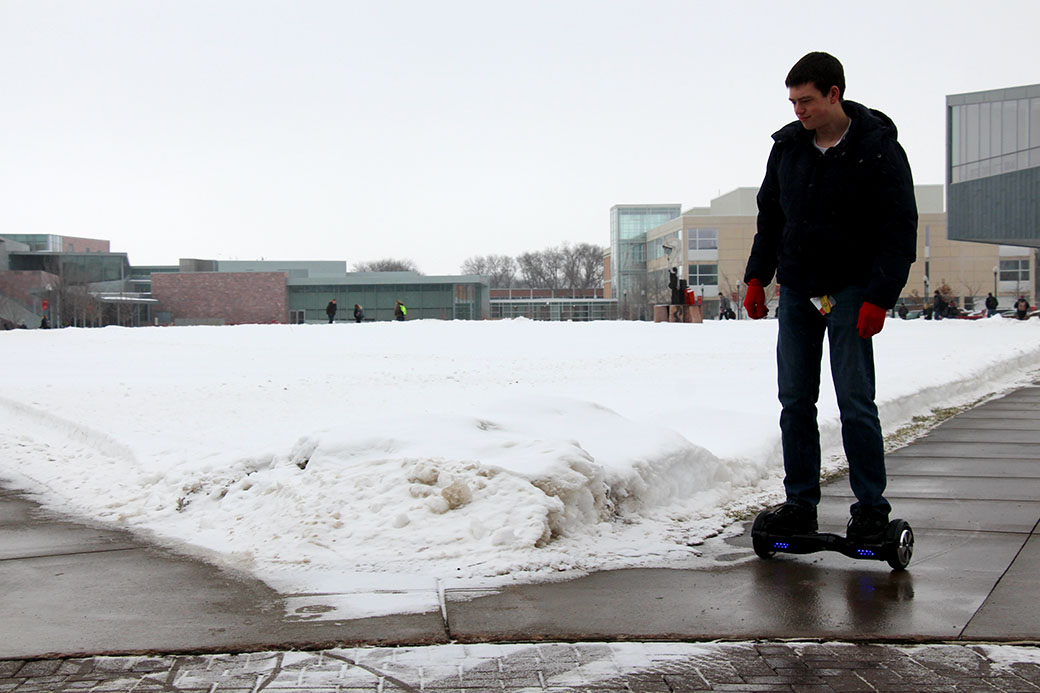
USD Housing bans hoverboards in dorms
Hoverboards topped many gift lists this past holiday season, but a recent ban enacted by USD Housing that prohibits students from keeping the self-balancing scooters in all residence halls will bring some of the fun to a screeching halt.
Earlier this month, the university announced students would have to remove their hoverboards from their dorm rooms and store them in their vehicle after various federal safety concerns indicated the devices posed fire dangers. If a student doesn’t have a vehicle, USD Housing officials will work with them to find a safe, secure storage area for the hoverboard.
This was disappointing news for sophomore Jordan Judt, who received a Swagway hoverboard for Christmas.
“I have seen them on campus, people using them, and I thought they looked neat and fun to use. It’s a different alternative from just riding my bike around,” Judt said. “Basically, (I was) frustrated because I just got it, and I was all set to have it on campus to use and now I can’t have it in my dorm.”
The Consumer Product Safety Commission has received numerous reports of the devices bursting into flames while charging, and even combusting during use. In a statement last week, the CPSC said there may be problems with the scooter’s lithium-ion battery packs, “as well as their interaction with the circuit boards inside the units,” and that they’re continuing to investigate the situation. Several airlines and universities, as well as retailers, have banned the hoverboards in some capacity within the last month.
“When you see these lithium batteries spontaneously combust, that really drove the conversation in terms of our administration here (at USD). Our initial conversation was ‘Where is a student most likely to charge a device like this if they had it?’ And the thought was ‘Where they reside.’ That was a grounded decision for why residence halls were our first priority,” said John Howe, the associate dean of Student Services.
Howe; Kim Grieve, dean of students and vice president of Student Services; Roberta Ambur, vice president of Information Technology; Darby Ganschow, director of Auxiliary Services; and Pete Jensen, UPD chief, were involved in the decision-making process.
While the self-balancing scooters may be banned in residence halls, USD officials haven’t extended the restrictions to any other parts of campus. But a discussion about whether they should be banned campus-wide may come up as a topic of discussion soon.
“There is a larger discussion going on to look at general use (of hoverboards) across campus,” Howe said. “That is still in the works. It’s going to be going to the vice presidents and it will come up at executive council.”
Prior to the outright ban of hoverboards in residence halls, USD Housing did not permit the devices to be used within dorms because of noise and safety concerns. USD is the only South Dakota Board of Regents school to restrict hoverboards in residence halls.
“In a residence hall facility, our number one concern is management, and we’re making sure students have a safe, secure living area. This was posing a threat to that,” said John Geske, assistant director of USD Housing.
Geske said there were “a handful” of students who live on campus that own a self-balancing scooter, and there hasn’t been much resistance from students about the ban. Howe said he met with one student who was upset by the banning, but after a conversation explaining why USD took the positioning it did, the issue was resolved, Howe said.
“It was important to address the issue in residence halls first and foremost because students aren’t probably going to be charging these things in a hallway, in the MUC, in Patterson, or in some other building,” Geske said.
Judt said he’s heard about the incidents with hoverboards, but believes most of the issues stem from knock-off brands manufacturing the self-balancing scooters. That’s why he thinks USD should be more lenient with its hoverboard ban.
“If there was some sort of review process or something where you say you have this reliable, name brand one where there’s no reports about anything happening with it (they should be allowed),” Judt said.
But the chance of the hoverboard ban in dorms isn’t likely to be lifted anytime soon.
“There is a possibility these batteries get corrected in the future, and a discussion can be had to look at this again,” Howe said. “But in the immediate future it’s definitely out for residential facilities.”


